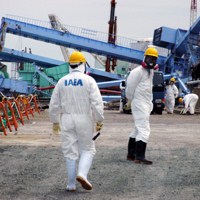Last week’s special session of the board of governors of the International Atomic Energy Agency (IAEA), convened primarily to secure emergency funding for enhanced safeguards activities in Iran, provided an acute reminder of both the IAEA’s importance and its precarious financial situation. The international community demands ongoing high performance from the agency, while chronically failing to replenish resources perilously close to exhaustion. And yet, given the agency’s central role in key nuclear nonproliferation and security efforts, the stakes could not be higher.
The IAEA is integral to international efforts as diverse as implementing the interim nuclear deal—and any potential follow-on comprehensive agreement—with Iran, responding to assistance requests following nuclear accidents such as Fukushima and preventing nuclear materials from falling into the hands of terrorists. In the 1990s, the agency used safeguards techniques to detect the fact that North Korea had made false declarations concerning its weapons-useable plutonium inventory. Following South Africa’s admission that it had covertly developed nuclear weapons, the agency verified that country’s full nuclear disarmament. And while the IAEA has sometimes struggled to detect covert nuclear activities—most prominently in Iraq, Syria and Iran—it has played a pivotal role in efforts to resolve nonproliferation compliance challenges in these and other cases. From the perspectives of Iran and the P5+1—the negotiating group composed of the five permanent members of the Security Council plus Germany—only the IAEA has both the independence and technical expertise to credibly verify nuclear agreements between the parties.
In November, after nearly a decade of diplomatic stalemate, the P5+1 and Iran finally negotiated an interim accord that will limit key dimensions of Iran’s nuclear program in exchange for sanctions relief. The agency will be vital to verifying Iran’s compliance with the accord, and thus facilitating ongoing negotiation of a comprehensive agreement. Verification will primarily require the IAEA to intensify its regular safeguards activities in Iran. Inspectors will, for example, enjoy daily access to the Natanz and Fordow enrichment facilities, rather than waiting weeks between inspections. Some provisions of the deal are novel, however, including a provision for “managed access” to certain facilities that will enable the agency to ensure that Iran complies with a freeze on new centrifuge production.

